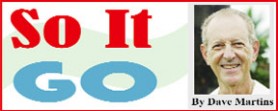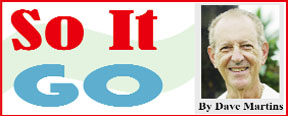I may be off about a year or so – I’m not good with dates – but it was around 1969. Literally out of nowhere, the Tradewinds band, based in Toronto, had landed at the top of the Caribbean music charts with a song I had written called “Honeymooning Couple”. On tour in the region, we had come to Guyana.
 Somebody – perhaps Gordon Forte – persuaded me to go to the Theatre Guild to see a local show that was very popular in Guyana, a kind of “new thing” as I recall the build up. It was at the original Theatre Guild Playhouse, and the show was a knockout. It was called “All O’ We” and featured a variety of talent, but I was particularly struck by the comedy/drama mix of local skits, largely in dialect, featuring Marc Matthews, Ken Corsbie and Henry Muttoo, that made up the heart of the show. The audience was eating it up.
Somebody – perhaps Gordon Forte – persuaded me to go to the Theatre Guild to see a local show that was very popular in Guyana, a kind of “new thing” as I recall the build up. It was at the original Theatre Guild Playhouse, and the show was a knockout. It was called “All O’ We” and featured a variety of talent, but I was particularly struck by the comedy/drama mix of local skits, largely in dialect, featuring Marc Matthews, Ken Corsbie and Henry Muttoo, that made up the heart of the show. The audience was eating it up.
I realized pretty quickly I was seeing something fresh. I had encountered this format of topical theatre in Canada but not in the Caribbean, and I was frankly surprised to find it here. Remember, this was 1969. The Guyana I knew, the one I had grown up in, was a place where local vernacular on the legitimate stage was frowned upon, and street culture, in particular, was definitely off limits, but here it was alive and kicking in “the theatah”.
It was like a calabash of cold water.
I clearly remember thinking, “What’s going on here? Who’s behind all this?”
What was going on of course, was the emergence of this talented trio of Guyanese – coming out of the original “He Wan” and later “Dem Two” shows – who had created this “All O’ We” creature that would go on to captivate audiences here and in the region for years to come.
I mention this episode for two reasons.
The first is that the show had a personal value for me. “All O’ We” was essentially tilling the same soil as I was with the songs about Caribbean society that I had begun writing in the late 1960s in Toronto. Tradewinds was this anomaly of a band formed in Canada, and based in Canada, but recording material for a Caribbean audience 2,000 miles away. It was therefore an artistic and economic stretch, doubts were involved, and though I didn’t say anything about it, the experience of seeing Marc and Ken and Henry served to reassure me that what I doing over there in that distant country was valid. We were, in effect, on the same road in different shoes, travelling to the same cultural audience.
You can say that Guyana’s recent independence was a factor for both them and me, and you could be right, but that is an abstract notion; the “All O’ We” show was on a stage in Georgetown; “Honeymooning Couple” was on the air. These were concepts grown into realities.
And there’s a deeper link. Remember again that 1969 was a scant three years after colonialism ended for us, and the self doubts and even self denigration from those times were still with us. Let me speak directly: it was still with me. The realization that we were indeed a people with examples of excellence among us had not come to me yet. I was still infected with this message I had grown up with that what we produced, what we developed, the things we built, even the language we spoke, were second-rate. I had not yet worked through that nonsense logically, as I eventually did. In 1969, I was still labouring, sometimes consciously so, under this aura of self doubt.
So that my approach, as a musician living in highly developed Canada, but choosing to turn my artistic lens back to the place I had come from, was something that took, as we say in GT, plenty belly. No other West Indian band in Toronto or Montreal or New York was doing that. Later on, some did, but not then. In fact, when we told our Trini fans in Toronto that we were going to Trinidad carnival, a four-piece band with no brass line and percussion, with four songs I had written, the response was often, “Padna! Allyuh mad, oui.”
In the scenario I had created for myself – bold face in front, but not so sure inside, about this Caribbean focus I was developing – to then walk into the Theatre Guild and hear “All O’ We” coming off the stage was a confirmation for me that we were beginning to recognise the value in ourselves and our culture; we were beginning to shed the doubts generated in our earlier history. Guyanese were applauding and paying for what only a few years previously we would have dismissed as “three fellas talkin’ stupidness”.
Although none of us knew it at the time, it showed that we were coming of age culturally; we were starting to identify and, more importantly, recognise our uniqueness. I had a hit song, and Marc, Ken and Henry had a hit show, based on our own thing; we were on the cusp of that together.
That unspoken professional kinship, generated between us as Guyanese in 1969, grew over the years in a lasting mutual respect. It was further strengthened in later years, when I moved to the Cayman Islands from Toronto, and became involved in getting, first Henry Muttoo, and later Ken and then Marc, to bring their artistic contributions there. I’m also indebted to Ken for the joke he told me, in a Tradewinds intermission in Barbados, that led to my song “Cricket in the Jungle”, and the title of this column is a frequent Corsbie declaration that exemplifies his coexistence view of life.
The other reason I mention “All O’ We” is that I want to wave a particular flag today for Ken, one of the linchpins of the group, and later a respected performer in the Caribbean, who is celebrating his 80th birthday on July 25th. It should be particularly noted that Ken’s work in entertainment has been more than diversion. Because of its strong cultural slant, it has contributed significantly to our sense of identity as a people; from it we have learned to laugh at ourselves; it has helped the culture to mature. Ken may downplay that aspect of his work, but it is there.
Ken Corsbie’s contributions to theatre, here and in the region, are substantial and have been noted elsewhere, but from Guyanese, on this milestone in his life, it would be nice if we emailed him a little thank you (kcorsbie@optonline.net) or even phoned him (631 744-3127) to say “thanks Ken” for all the laughter and bounce he has brought into our lives for so many years.
Mind you, he may cuss you blue for not buying his CDs, but that’s Ken. Besides, he’s right; so he go.





